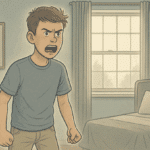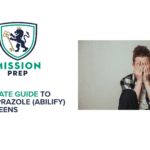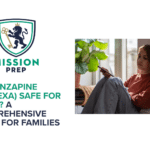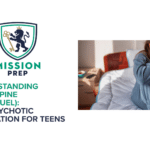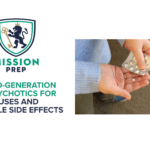Risperidone for Teen Mental Health: Does It Work?

As a parent or caregiver, very few things are more difficult than watching your child struggle with a serious mental health disorder and not knowing how to help. For this reason, conditions like schizophrenia, bipolar disorder, and autism can take a toll on both teens and the families who love them.
At this point, you may have researched extensively and exhausted all other avenues. Perhaps the only thing left to try is medication.
One option that often comes up in conversations about mental health is a medication called “risperidone,” also known by its brand name Risperdal. It’s frequently used to reduce the symptoms of conditions like the ones mentioned earlier, yet you may have many questions surrounding how it works and how safe it is.
At Mission Prep, our goal is to provide clear, compassionate, and factual guidance for families navigating tough choices around medications. In this article, we’ll take a deep dive into risperidone, covering:
- What risperidone is and how it works
- The conditions treated by risperidone in teens
- Risperidone dosage for adolescents
- Risperidone side effects for teens
- Long-term usage and withdrawal from risperidone
- Frequently asked questions about risperidone
- The importance of a comprehensive treatment plan
- Getting help for your teen at Mission Prep Healthcare today

What Is Risperidone and How Does It Work?
Risperidone is a type of medication called an atypical antipsychotic. Atypical antipsychotics work to change the way chemical messengers, or neurotransmitters, work in the brain. Neurotransmitters play an important role in regulating moods, behaviors, and the way we perceive the world around us.
Atypical antipsychotics, also called “second-generation antipsychotics” (SGAs), are an improvement from the earliest antipsychotics, called “typical psychotics” or “first-generation antipsychotics” (FGAs).
Unlike earlier antipsychotics, risperidone is seen to be more effective in treating certain mental health symptoms.¹ The medication also produces fewer movement-related side effects, like tremors, muscle stiffness, and other uncontrollable movements. However, SGAs like risperidone can cause some undesirable side effects like weight gain, sleep issues, and hormonal problems.
This information can feel like a lot to take in, but providers typically prescribe risperidone only as a last resort or if there’s no other option available. Treatments start at the lowest dose possible, and adolescents are monitored carefully to promptly manage any problems that may arise. Not all teens react the same way, and your provider will prescribe medication based on:
- Your teenager’s medical diagnosis and symptoms
- How severe the symptoms are
- How well your teen is tolerating the drug
- Any other medical conditions your teen may be having
- Carefully evaluating the benefits vs. risks
It’s important to have an open conversation with your provider, discussing any fears and concerns you have. This way, you can feel fully informed on all aspects of treatment and can make the right choice for your teen.
Conditions Approved for Treatment in Adolescents With Risperidone
The FDA has approved risperidone for the treatment of:²
- Schizophrenia in children 13 years and older
- Bipolar I acute manic or mixed episodes (as monotherapy) in children 10 years and older
- Autism-associated irritability in children aged 5 years and older
Risperidone is also used off-label sometimes.³ Off-label usage is when a provider prescribes a medication for a condition that isn’t FDA-approved. The practice isn’t illegal and can take place because:
- There’s no approved drug to treat the condition
- Other approved treatments have been tried with no success
Your provider will inform you if a recommended medication has not been approved by the FDA. Yet, they may also recommend using risperidone off-label to treat the following:⁴
- Borderline personality disorder
- Conduct disorder
- Delirium
- Depression
- Delusional disorder
- Some types of brain injuries
- Posttraumatic stress injury
- Lesch-Nyhan syndrome
- Tourette syndrome
- Trichotillomania
- Speech disorders
- Movement disorders
- Developmental disorders
- Aggression and agitation in patients with dementia
- Nonpsychotic unipolar depression with antidepressant therapy
- Hyperactivity, cognitive issues, social impairment, and other specific behaviors associated with autism
How Risperidone Works in Teens
Risperidone changes the way brain chemicals, called “neurotransmitters, like dopamine and serotonin, affect moods, behaviors, and perception. Let’s look at how these chemicals affect how we feel.
Dopamine:
Dopamine has a key role to play in motivation, learning, and movement. It helps you feel pleasure and satisfaction when you do something fun or engage in an activity that you enjoy.⁵ Dopamine also has a major role to play in regulating your moods, memory, sleep patterns, concentration, and alertness.
Dopamine dysfunction has been linked to mental health conditions like schizophrenia, depression, and psychosis (which is when there’s a disconnect from reality). Excessive dopamine can also cause aggression and difficulties controlling impulses. In contrast, low levels can make you feel less motivated and affect movements, causing issues like muscle stiffness or difficulties walking.
Serotonin:
Serotonin plays a key role in several important functions, like stabilizing moods, anxiety, sleep, hunger, learning, and memory.⁶
Research is ongoing about the role serotonin plays in the development of mental health disorders. Yet, it has been linked to major depressive disorder and other mood disorders.⁷ For instance, researchers have established a link between abnormal serotonin functioning and the development of schizophrenia, but the exact way this takes place is still being studied.⁸
Teen Mental Health Treatment With Risperdal
By affecting the way neurotransmitters work, risperidone can help reduce the symptoms of severe mental health disorders, such as the following.
Risperdal for Treating Teenage Schizophrenia
Risperdal for schizophrenia can benefit a teen by reducing some or all of the following symptoms:⁹
- Hallucinations
- Delusions
- Disorganized thinking or the inability to make sense of things
- Little interest in being around other people
- Difficulties speaking clearly
- Lack of motivation
For instance, a six-week study from 2009 established that adolescents with schizophrenia ( aged between 13 to 17 years) taking Risperdal experienced significant improvement in symptoms.¹º
Using Risperdal for Bipolar Disorder in Teens
Risperidone is commonly used for the short-term treatment of bipolar disorder in teens who don’t respond to other forms of treatment. For example, clinical studies show that Risperdal is beneficial in the treatment of acute manic and mixed episodes of bipolar disorder I.¹¹
Risperdal for Autism Spectrum Disorder in Adolescents
Risperidone has proven to be effective in short-term use for reducing irritability, aggression, tantrums, and self-injurious behaviors in children with autism spectrum disorder.¹² Side effects seen in participants, such as weight gain, fatigue, dizziness, increased appetite, drooling, constipation, and tremors, were seen to be mild and eventually resolved over a few weeks.
Risperidone for ADHD, ODD, and DMDD in Teens
Risperidone is not FDA-approved for ADHD in teens, however, some clinicians prescribe it when symptoms are severe and disruptive.¹³ It may also be prescribed for other conditions, like oppositional defiant disorder (ODD) and disruptive mood dysregulation disorder (DMDD) to address aggression, recklessness, or risk-taking behaviors.
Other medication options that have fewer side effects exist for these conditions, and it’s advisable to explore alternatives with your provider.
Risperidone Dosage for Adolescents
Each teen is unique, and treatment plans should be adapted to meet their specific needs. Therefore, your provider will determine the most appropriate dosage for your teen based on multiple factors.
In general, providers start with the lowest dosage possible. Yet, they may gradually increase the dose depending on how well your teen tolerates the medication. The following are some dosage guidelines based on different conditions.
- Schizophrenia and bipolar disorder mania: For adolescents, the lowest starting dose is 0.5 mg.¹⁴
- Autism-related mood issues: The lowest starting dose can vary depending on the weight of the adolescent, for example…
- 0.25 mg for adolescents under 20 kg
- 0.50 mg for adolescents weighing over 20 kg
Risperidone is available as a tablet, an oral solution, and an orally disintegrating tablet (dissolves in the mouth).
Risperidone Side Effects for Teens
All medications carry the potential for risks and side effects. Discussing these as part of the treatment plan can help you stay informed and aware of what to expect going forward. The following are common side effects a teen may encounter early in treatment.
Common Risperidone Side Effects:
- Drowsiness and sedation
- Dizziness
- Fatigue
- Headaches
- Anxiety
- Restlessness
- Increase appetite
- Vomiting
- Nausea
- Drooling
- Weight gain
- Constipation
- Insomnia
- Increased prolactin (a type of hormone)
- Cold symptoms, such as a runny nose, fever, or cough
- Difficulties passing urine
- Upper abdominal pain
- Involuntary movements
- Reduced emotional reactivity
Let’s take a look at some of the more common risperidone side effects and concerns in more detail.
Risperidone and Weight Gain in Teens
One of the most well-known side effects of risperidone is the potential for weight gain. A recent 6-month study highlights that adolescents on risperidone can gain a significant amount of weight (over 7% from baseline).¹⁵ Additionally, it can also increase levels of sugar and cholesterol.
Providers usually take baseline measurements of weight, glucose levels, and lipid levels before and during treatment to monitor and treat any weight gain promptly.
Risperdal And Sleep Problems in Teenagers
Studies show variations in how risperidone affects teenagers when it comes to sleep. Yet, in general, teenagers experience increased sleepiness.¹⁶ This increased sleepiness can be a benefit. For example, teens with autism and ADHD have reported improvements in sleep issues and the ability to fall asleep faster.¹⁸ However, it can also create problems. For instance, risperidone may cause sleep issues in teens with Tourette’s syndrome.¹⁷ If sleep issues become a concern, it’s important to speak to your provider as they may be able to adjust the medication.
Less Common Risperidone Side Effects
Risperidone may cause an increase in a hormone called “prolactin,” which is linked to breast enlargement, production of breast milk, and bone loss in girls. It can also cause breast growth and interfere with sperm production in boys.¹⁹
Long-Term Use and Withdrawal of Risperidone in Teens
There are a variety of reasons why a teen may want to stop taking risperidone. For example, they may not see any benefits, experience too many side effects, or feel well enough to function without it. However, it’s critical to ensure that your teen does not stop taking powerful medication like antipsychotics on their own to prevent adverse side effects or relapses. Risperidone withdrawal symptoms aren’t considered life-threatening, but they can be highly unpleasant.
Stopping Risperdal Safely for Teens
Risperdal usage can be stopped by working together with your provider, who will gradually reduce the dosage in stages. If you miss a dose, take it as soon as you can, unless it’s time for your next dose.
Long-Term Considerations
The long-term effects of Risperdal are still being researched. However, the prolonged use of antipsychotics can cause a condition called “tardive dyskinesia,” where people develop uncontrollable, repetitive, and abnormal movements involving the face, mouth, tongue, limbs, and trunk.²⁰
Risperdal has shown a lower risk of causing this condition; however, if your teen develops symptoms, it’s important to seek medical care immediately.
The Importance of a Comprehensive Treatment Plan
At Mission Prep, we believe in a holistic, team-based approach to treating mental health conditions. Our approach is to go beyond symptom management to achieve long-term recovery.
To ensure adolescents get the best care possible, we use a combination of evidence-based approaches, including psychotherapy, social and life skills interventions, and education about conditions and how to manage them.²¹ We also promote family involvement in treatment. This approach gives teens the best chance at learning how to manage their emotions and deal with life’s challenges, building confidence and resilience in the process.
Getting Help for Your Teen at Mission Prep Today
While risperidone may not be the solution for every teen, it has helped many stabilize their moods, gain more control over their emotions, and take back control of their lives.
If you’re considering risperidone for your teen or are looking for more information about treatment options, it’s good to talk to a trusted healthcare provider. Mission Prep can help.
Our team provides mental health treatment options that work. We also support adolescents and their families across a range of mental health disorders, including schizophrenia, bipolar disorder, anxiety, depression, ADHD, trauma, and anger issues.
Our treatment programs include:
- Residential mental health treatment for 24/7 care under compassionate mental health care experts
- Outpatient mental health treatment with flexible scheduling and telehealth options
- Intensive outpatient programs for structured yet affordable mental health treatment options
- Summer programs for teens who need more structure during the out-of-school months
Taking that first step forward is a brave decision, and you don’t have to face it alone. Connect with us today by filling out our contact form or contacting us via phone call.
We’re here to support you every step of the way.

References
- Madaan, V. (2011). Clinical utility of the risperidone formulations in the management of schizophrenia. Neuropsychiatric Disease and Treatment, 611. https://doi.org/10.2147/ndt.s14385
- McNeil, S. E., Gibbons, J. R., & Cogburn, M. (2024, November 10). Risperidone. StatPearls – NCBI Bookshelf. https://www.ncbi.nlm.nih.gov/books/NBK459313/
- Office of the Commissioner. (2018, February 5). Understanding unapproved use of approved drugs “Off label.” U.S. Food And Drug Administration. https://www.fda.gov/patients/learn-about-expanded-access-and-other-treatment-options/understanding-unapproved-use-approved-drugs-label
- McNeil, S. E., Gibbons, J. R., & Cogburn, M. (2024, November 10). Risperidone. StatPearls – NCBI Bookshelf. https://www.ncbi.nlm.nih.gov/books/NBK459313/
- Healthdirect Australia. (2023, October 17). Dopamine. Healthdirect. https://www.healthdirect.gov.au/dopamine
- Bakshi, A., & Tadi, P. (2022, October 5). Biochemistry, serotonin. StatPearls – NCBI Bookshelf. https://www.ncbi.nlm.nih.gov/books/NBK560856/
- Lin, S., Lee, L., & Yang, Y. K. (2014). Serotonin and Mental Disorders: A concise review on Molecular Neuroimaging evidence. Clinical Psychopharmacology and Neuroscience, 12(3), 196–202. https://doi.org/10.9758/cpn.2014.12.3.196
- Quednow, B. B., Geyer, M. A., & Halberstadt, A. L. (2020). Serotonin and schizophrenia. In Handbook of behavioral neuroscience (pp. 711–743). https://doi.org/10.1016/b978-0-444-64125-0.00039-6
- National Alliance on Mental Illness. (2024b, December 23). Risperidone (Risperdal) | National Alliance on Mental Illness (NAMI). National Alliance on Mental Illness (NAMI). https://www.nami.org/about-mental-illness/treatments/mental-health-medications/types-of-medication/risperidone-risperdal/
- Europe PMC. (n.d.). A 6-week, randomized, double-blind, placebo-controlled study of the efficacy and safety of risperidone in adolescents with schizophrenia. Europe PMC. https://europepmc.org/article/MED/20035579
- Haas, M., DelBello, M. P., Pandina, G., Kushner, S., Van Hove, I., Augustyns, I., Quiroz, J., & Kusumakar, V. (2009). Risperidone for the treatment of acute mania in children and adolescents with bipolar disorder: a randomized, double‐blind, placebo‐controlled study. Bipolar Disorders, 11(7), 687–700. https://doi.org/10.1111/j.1399-5618.2009.00750.x
- McCracken, J. T., McGough, J., Shah, B., Cronin, P., Hong, D., Aman, M. G., Arnold, L. E., Lindsay, R., Nash, P., Hollway, J., McDougle, C. J., Posey, D., Swiezy, N., Kohn, A., Scahill, L., Martin, A., Koenig, K., Volkmar, F., Carroll, D., . . . McMahon, D. (2002). Risperidone in Children with Autism and Serious Behavioral Problems. New England Journal of Medicine, 347(5), 314–321. https://doi.org/10.1056/nejmoa013171
- Miller, C. (2025, February 4). What parents should know about Risperdal. Child Mind Institute. https://childmind.org/article/what-parents-should-know-about-risperdal/
- Janssen. (1993). HIGHLIGHTS OF PRESCRIBING INFORMATION. U.S. Food & Drug Administration. https://www.accessdata.fda.gov/drugsatfda_docs/label/2009/020272s056,020588s044,021346s033,021444s03lbl.pdf
- Martin, A., Landau, J., Leebens, P., Ulizio, K., Cicchetti, D., Scahill, L., & Leckman, J. F. (2000). Risperidone-Associated Weight Gain in Children and Adolescents: A Retrospective Chart review. Journal of Child and Adolescent Psychopharmacology, 10(4), 259–268. https://doi.org/10.1089/cap.2000.10.259
- Zalsman, G., Carmon, E., Martin, A., Bensason, D., Weizman, A., & Tyano, S. (2003). Effectiveness, Safety, and Tolerability of Risperidone in Adolescents with Schizophrenia: An Open-Label Study. Journal of Child and Adolescent Psychopharmacology, 13(3), 319–327. https://doi.org/10.1089/104454603322572651
- Arana-Lechuga, Y., Sanchez-Escandón, O., De Santiago-Treviño, N., Castillo-Montoya, C., Terán-Pérez, G., & Velázquez-Moctezuma, J. (2008). Risperidone treatment of sleep disturbances in Tourette’s Syndrome. Journal of Neuropsychiatry, 20(3), 375–376. https://doi.org/10.1176/jnp.2008.20.3.375
- Eapen, V., & Gururaj, A. K. (2005b). Risperidone treatment in 12 children with developmental disorders and Attention-Deficit/Hyperactivity Disorder. The Primary Care Companion for CNS Disorders, 7(5). https://doi.org/10.4088/pcc.v07n0502
- Miller, C. (2025, February 4). What parents should know about Risperdal. Child Mind Institute. https://childmind.org/article/what-parents-should-know-about-risperdal/
- National Alliance on Mental Illness. (2024b, December 23). Risperidone (Risperdal) | National Alliance on Mental Illness (NAMI). National Alliance on Mental Illness (NAMI). https://www.nami.org/about-mental-illness/treatments/mental-health-medications/types-of-medication/risperidone-risperdal/
- Reeves, G., & Anthony, B. (2009). Multimodal Treatments versus Pharmacotherapy Alone in Children with Psychiatric Disorders. Pediatric Drugs, 11(3), 165–169. https://doi.org/10.2165/00148581-200911030-00002

